
South entrance gate to the monastery. (1180k)
From the Rila Monastery entry in Wikipedia:
The Monastery of Saint Ivan of Rila, better known as Rila Monastery is the largest and most famous Eastern Orthodox monastery in Bulgaria. It is situated in the southwestern Rila Mountains, 117 km (73 miles) south of the capital Sofia in the deep valley of the Rilska River ("Rila River"), inside of Rila Monastery Nature Park. The monastery is named after its founder, the hermit Ivan of Rila (876 - 946 CE), and houses around 60 monks.
It is traditionally thought that the monastery was founded by the hermit St. Ivan of Rila, whose name it bears, during the rule of Tsar Peter I (927-968). The hermit actually lived in a cave without any material possessions not far from the monastery's location, while the complex was built by his students, who came to the mountains to receive their education.
Ever since its creation, the Rila Monastery has been supported and respected by the Bulgarian rulers. Large donations were made by almost every tsar of the Second Bulgarian Empire up until the Ottoman Conquest, making the monastery a cultural and spiritual center of Bulgarian national consciousness that reached its apogee from the 12th to the 14th century.
The Rila Monastery was re-erected at its present place by Hrelyu, a feudal lord, during the first half of the 14th century. The oldest buildings in the complex date from this period -— the Tower of Hrelyu (1334–1335) and a small church just next to it (1343). The bishop's throne and the rich-engraved gates of the monastery also belong to the time. However, the arrival of the Ottomans in the end of the 14th century was followed by numerous raids and a destruction of the monastery in the middle of the 15th century.
Thanks to donations by the Sultana Mara Branković, the Russian Orthodox Church and the Rossikon monastery of Mount Athos, the Rila Monastery was rebuilt in the end of the 15th century by three brothers from the region of Dupnica. With Sultana Mara Branković's influence Ivan of Rila's relics were moved from Tarnovo into the new complex in 1469.
The complex acted as a depository of Bulgarian language and culture in the ages of foreign rule. During the time of the Bulgarian National Revival (18th-19th century), it was destroyed by fire in 1833 and then reconstructed between 1834 and 1862 with the help of wealthy Bulgarians from the whole country, under the famous architect Alexi Rilets. The erection of the residential buildings began in 1816, while a belfry was added to the Tower of Hrelyu in 1844. Neofit Rilski founded a school in the monastery during the period. The monastery is known as being one of the hideouts of Bulgarian revolutionaries such as Vassil Levski, Gotse Delchev, Peyo Yavorov, etc.
Rila Monastery is a UNESCO World Heritage Site.
All pictures are © Dr. Günther Eichhorn, unless otherwise noted.


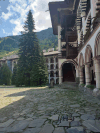






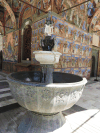

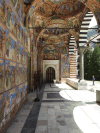


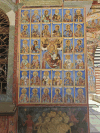

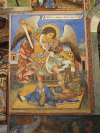

This page contains 18 pictures

Main page for България (Bulgaria)
Page last updated on Fri Jun 17 10:40:24 2022 (Mountain Standard Time)
Rila Monastery on aerobaticsweb.org